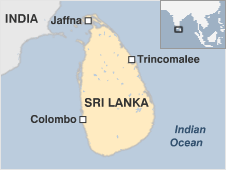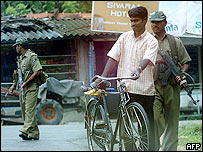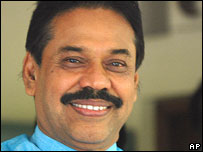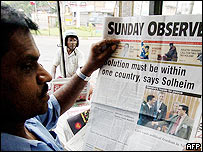Generic Medicines
Taj Pharma is the largest generic pharmaceutical company in India. We hold top positions in different established markets worldwide generics markets..
Lying off the southern tip of India the tropical island of Sri Lanka has beguiled travellers for centuries with its palm-fringed beaches diverse landscapes and historical monuments.
 |
But the island has been scarred by a long and bitter civil war arising out of ethnic tensions between the majority Sinhalese and the Tamil minority in the northeast.
After more than 25 years of violence the conflict appeared to be at an end - at least militarily - in May 2009 when government forces eliminated the last area controlled by Tamil Tiger rebels.
Known as "Serendip" to Arab geographers the island fell under Portuguese and Dutch influence and finally came under British rule when it was called Ceylon.
NATION AT WAR
 Army and Tamil separatists fought a long conflict involving air raids roadside blasts suicide bombings land and sea battles
More than 70,000 killed
1983 - Start of war
2002 - Ceasefire is signed but violence escalates in 2006
2008 - Ceasefire ends renewed fighting erupts
2009 - Government forces re-conquer all rebel-held territory
|
There is a long-established Tamil minority in the north and east. The British also brought in Tamil labourers to work the coffee and tea plantations in the central highlands making the island a major tea producer.
But the majority Buddhist Sinhalese community resented what they saw as favouritism towards the mainly-Hindu Tamils under British administration.
The growth of a more assertive Sinhala nationalism after independence fanned the flames of ethnic division until civil war erupted in the 1980s between Tamils pressing for self-rule and the government.
Most of the fighting took place in the north. But the conflict also penetrated the heart of Sri Lankan society with Tamil Tiger rebels carrying out devastating suicide bombings in Colombo in the 1990s.
The violence killed more than 70,000 people damaged the economy and harmed tourism in one of South Asia's potentially prosperous societies.
A ceasefire and a political agreement reached between the government and rebels in late 2002 raised hopes for a lasting settlement. But Norwegian-brokered peace talks stalled and monitors reported open violations of the truce by the government and Tamil Tiger rebels.
Escalating violence between the two sides in 2006 killed hundreds of people and raised fears of a return to all-out war. In January 2008 the government said it was withdrawing from the 2002 ceasefire agreement. The ceasefire expired a fortnight later.
Following a renewal of fighting a large-scale government offensive succeeded in breaking the long stalemate and in January 2009 troops captured the northern town of Kilinochchi held for ten years by the Tigers as their administrative headquarters.
Thereafter the army steadily pushed the Tamil Tigers into an ever shrinking area of the north-east before finally overrunning the last rebel-held position in May and prompting the government to declare the Tamil Tigers defeated.
International concern was raised about the fate of the estimated 70,000 to 200,000 civilians thought to have been caught up in the conflict zone.
President: Mahinda Rajapaksa
Mahinda Rajapaksa prime minister at the time of his election won the November 2005 presidential poll by a narrow margin. His main rival was the opposition leader Ranil Wickremesinghe.

Mahinda Rajapaksa took a tough stance against Tamil rebels
|
Mr Rajapaksa was backed by Marxist and Buddhist parties in the government. He also benefited from an extremely low turnout by Tamils in the north and east.
He pledged to maintain Sri Lanka's character as a unitary state opposing the decentralisation demanded by many Tamils and took a hard line in peace talks with the Tamil Tigers.
In 2009 his public standing received a boost from his government's success in crushing the Tigers' armed rebellion.
Riding high in popular esteem after the military victory in October 2009 the government announced that presidential and parliamentary elections would be held by April 2019 - nearly two years ahead of schedule.
Mr Rajapaksa hopes to capitalise on his personal popularity among the Sinhalese majority to secure a two-thirds majority that would enable him to change the constitution.
He says that he will wait until after the vote to introduce political reforms aimed at promoting reconciliation with the Tamil minority.
But critics accuse him of being vague about concrete plans for addressing Tamil grievances.
Mr Rajapaksa a Buddhist lawyer became prime minister in 2004 heading a heavily-polarised parliament.
He served under Chandrika Bandaranaike-Kumaratunga president since 1994. She had backed economic liberalisation while in office but government rifts slowed the pace of change.
Mrs Bandaranaike-Kumaratunga's coalition was also divided over the Tamil peace process. The former president pursued a twin-track approach during the civil war trying to offer the Tamil rebels some form of autonomy while seeking the upper hand on the battlefield.
The Sri Lankan president can appoint and dismiss the prime minister and can dissolve parliament.
Media outlets are divided along linguistic and ethnic lines with state-run and private operators offering services in the main languages.

Deteriorating security has had an impact on the media
|
Many of the main broadcasters and publications are state-owned including two major TV stations radio networks operated by the Sri Lanka Broadcasting Corporation (SLBC) and newspapers in Sinhala Tamil and English.
There are more than a dozen private radio stations and eight privately-run TV stations. Sri Lanka's privately-owned press and broadcasters often engage in political debate and criticise government policies.
But the country is one of the most dangerous places in the world for journalists. In late 2008 a grouping of international media freedom groups noted a deteriorating situation marked by "murders attacks abductions intimidation and harassment of the media".
Reporters Without Borders says the media come under pressure from the authorities while the Tamil Tigers "allow no dissident voices" in the areas they control.
The internet is a growing medium for news; many papers have online editions. There were more than 770,000 internet users by March 2008 according to world telecoms body the ITU.
BBC World Service programmes in Sinhala and Tamil are relayed by SLBC under an agreement between the two broadcasters.
Press
Television
Radio
News agencies
TamilNet - Tamil news service
AFRICA | ASIA-PACIFIC | AMERICAS | EUROPE | MIDDLEEAST | SOUTHASIA
![]()
![]()
![]()
Mauritania Mauritius Morocco Mozambique Namibia Niger Nigeria Republic-of-congo Rwanda Sao-tome-and-principe Senegal Seychelles Sierra-leone Somalia South-africa Sudan Swaziland Tanzania The-gambia Togo Tunisia Uganda Australia Brunei Burma Cambodia China East-timor Fiji Indonesia Japan Kazakhstan Kiribati Kyrgyzstan Laos Malaysia Marshall-islands Micronesia Mongolia Nauru New-zealand North-korea Palau Papua-new-guinea Samoa Singapore Solomon-islands South-korea Taiwan Tajikistan Thailand The-philippines Tonga Turkmenistan Tuvalu Uzbekistan Vanuatu Vietnam Antigua-and-barbuda Belize Bolivia Brazil Canada Chile Colombia Costa-rica Cuba Dominica Dominican-republic Ecuador El-salvador Grenada Guatemala Guyana Haiti Honduras Jamaica Mexico Nicaragua St-kitts-and-nevis St-lucia Suriname Trinidad-and-tobago Uruguay Venezuela Albania Andorra Armenia Austria Azerbaijan Belarus Belgium Bosnia-hercegovina Bulgaria Croatia Cyprus Czech-republic Denmark Estonia Finland France Georgia Germany Greece Hungary Iceland Ireland Italy Latvia Liechtenstein Lithuania Luxembourg Macedonia Malta Moldova Monaco Montenegro Norway Poland Portugal Russia San-marino Serbia Slovakia Slovenia Spain Sweden Algeria Egypt Iran Iraq Israel-and-palestinian-territories Jordan Kuwait Lebanon Libya Mauritania Oman Saudi-arabia Sudan Syria Tunisia United-arab-emirates Yemen Afghanistan Bangladesh Bhutan India Nepal Pakistan Sri-Lanka The-Maldive